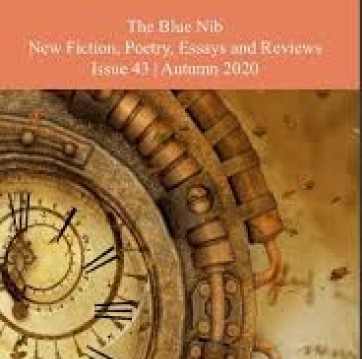Editorial for The Blue Nib, Issue 43.
In selecting poetry for this Issue, I was reminded yet again of the particular form of magic that this art form exerts over us. Poetry is often referred to as being an unveiling of sorts, an emotional letting go, the act of which brings with it a level of transcendence – but equally it is a craft, where form and expression are finely honed and underpinned by intellectual rigour.
In the best poetry, the effect is quite natural. The effort that has been poured into it is invisible, and whole works together seamlessly; we, the readers, are simply left moved, if not changed, by the experience of reading or hearing it.
The work of the four poets presented in Issue 43 all do this superbly well. Their poetry, varied in subject matter and style, is always lucid, finely crafted, and appeals to both heart and mind.
Our featured poet, Peter Boyle leads us into a territory of deep reflection and, in language both humble and fearless, articulates what many of us fumble towards at some point in our lives, as he speculates in ‘Figure in a small icon’ that ‘If the earth explodes this night / and I am all that is left of humanity / any future sentient being … / will see only the godhead buried / at every moment within us – / not the deceit, the violence, the greed / that ruled our days.’ ‘The parade of moments’ of our lives – the title of his second poem – concludes with the exquisite image of a life potentially slipping through a hole in a trouser pocket, memorable in its littleness.
In an act of extraordinary courage and dignity, Kate McNamara’s first poem ‘To Eamon’ pays heartbreaking homage to her ‘implacably dead’ son, squeezing language to use ‘what thin words’ are left to her as she reflects upon how his life ‘gleams and leaps somewhere / beyond me, as if / a bright fish dreamt it’. Her second poem, ‘Tree as cosmos’, carries with it a suggestion of redemption, where she pauses to ‘learn’ the language of trees, ‘curator of memory / consecration of time / studded with stars’.
Frailty and strength are also twin themes of Davide Angelo’s powerful portrayal of an ‘Open house’, where ‘glass is an unbreakable honeyed mass, / At its most fragile as it spools and cools into form, invisible / Until it cracks against the wings of sparrows’. If the nature of the ultimate is pondered, so are the beginnings of things; in his second poem, ‘Mountain at the end of the world’, he reflects, ‘There was a time when we were first / spoke the first word / told the first lie, made the first kill / felt the first wave of remorse / only to forget for the first time’.
Julie Maclean also takes us back to beginnings. Steeped in gentle irony, ‘Shark baby Hallelujah’ is simultaneously a tribute to the sculptures of a textile artist and to the birth of her child ‘Lamb-boy with wings, I want to keep you / but not as a tooth sculpture on a plinth … / You are my pillow-ticking chrysalis … / I finger each of your vertebrae / through the flesh carapace / of my doming womb.’ Her second poem, ‘An hour in the gallery of glass’, speculates ‘Is this what we have become / How we manage the past / Make it beautiful / or leave it buckling among salt bush / and clots of granite / as testament to survival?’
Please immerse yourself in the poetry of these four exceptional artists, and let them work their magic upon you.
Denise O’Hagan
Sydney, August 2020

